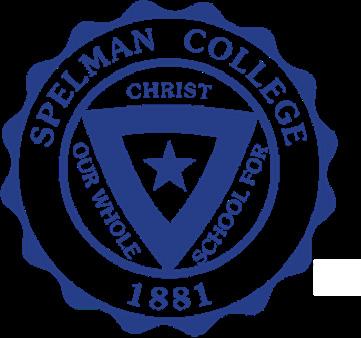












SUNDAY, AUGUST SEVENTEENTH, TWO THOUSAND TWENTY-FIVE TEN O’CLOCK IN THE MORNING
MARTIN LUTHER KING JR. INTERNATIONAL CHAPEL
MOREHOUSE COLLEGE & SPELMAN COLLEGE
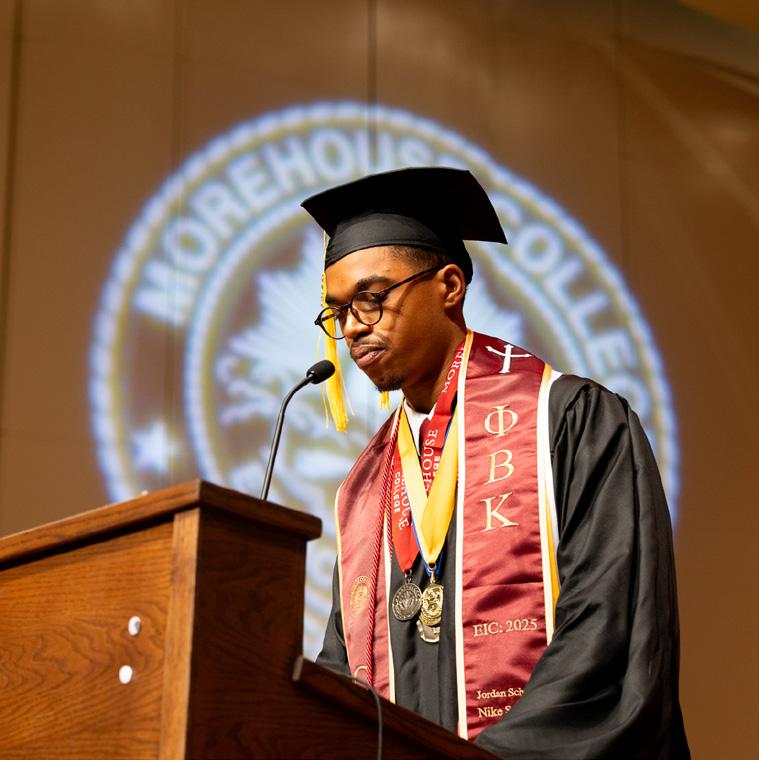
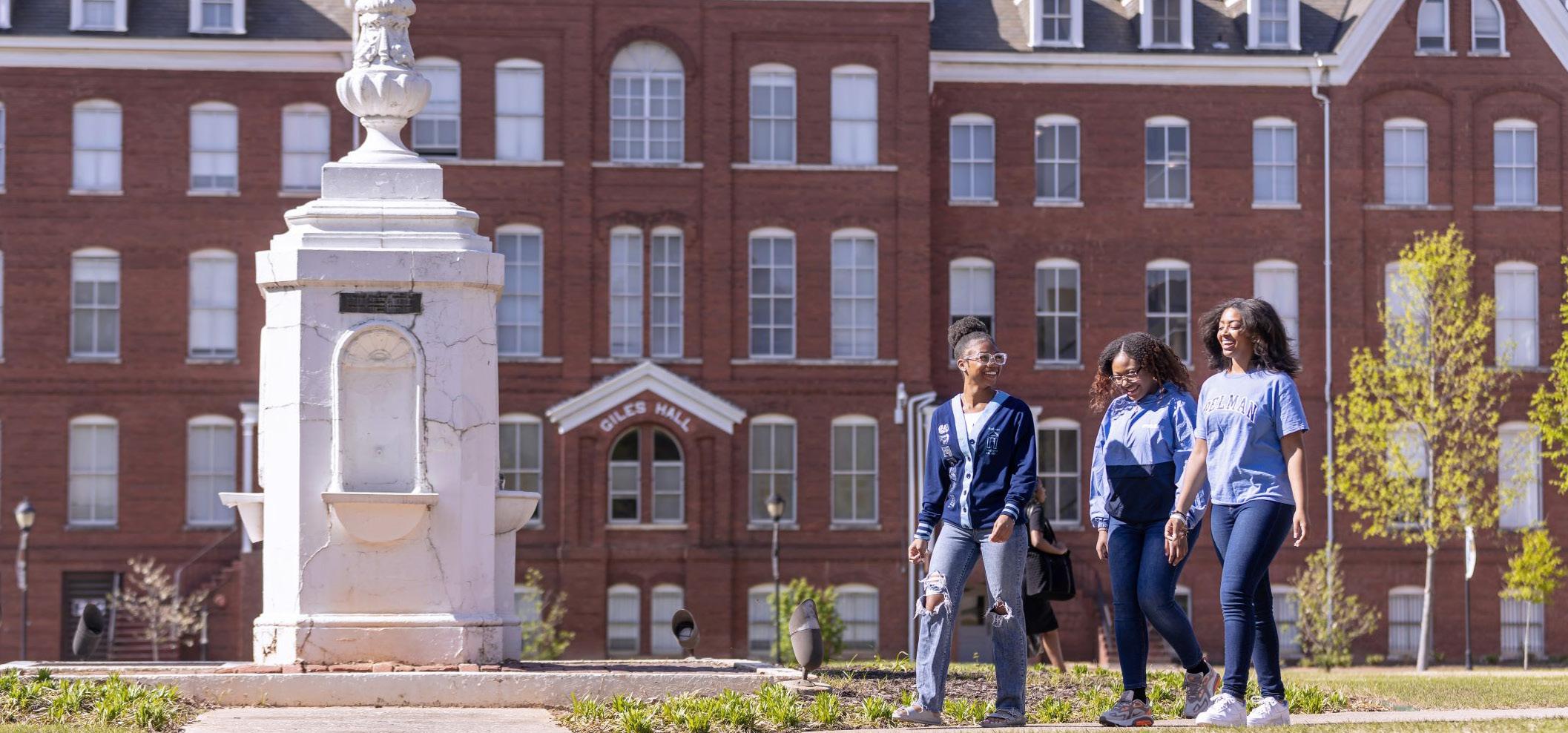
The Reverend Lawrence Edward Carter Sr., Ph.D. Dean of the Chapel, Morehouse College
ORGAN PRELUDE
COMMUNITY HYMN
OPENING PRAYER
WELCOME
SCRIPTURE
MUSICAL SELECTION
AFRO-HERMENEUTICS
Presiding
“Now Thank We All Our God” Karg-Elert
“Lift Every Voice and Sing”
Text: James Weldon Johnson
Music: J. Rosamund Johnson
The Reverend Neichelle R. Guidry, Ph.D. Dean of the Chapel, Spelman College
Joyce Finch Johnson, D.Mus. Professor Emerita of Music College Organist, Spelman College
INTRODUCTION OF SPEAKER
Psalm 27
New International Version
The Purpose of Education
MLK Jr., Maroon Tiger 1947
Excerpt from “The Highest Power” in In The Spirit Susan L. Taylor
Alonzo Louis Brinson, ’27 King Chapel Assistants President
The Reverend Dean Carter
The Reverend Dean Guidry
Ms. Maya Evans, C‘28 2025-2026 WISDOM Scholar Co-Lead, Sisters Chapel Assistants
SpelHouse Gospel Choir
Mr. Nathanial Lolley, ’26 King Chapel Assistants
Ms. Aniyah G. Pouncy, C’26 2025-2026 WISDOM Scholar
Sisters Chapel Assistants
Rosalind “Roz” Brewer, C’84 Interim President Spelman College
MINISTRY OF THE ARTS
PRESIDENTIAL ADDRESS
COMMUNITY PRAYER
CAMPUS MINISTRY ANNOUNCEMENTS
ORGAN POSTLUDE
Improvisation on “O God, Our Help In Ages Past” Arr., David Oliver
Movements of Praise & Anointed Vessels Sisters Chapel Arts Ministries
Dr. F. DuBois Bowman, ’92 13th President Morehouse College
The Reverend Dean Carter
The Reverend Dean Guidry
Mr. Damarion King,’27 Vice President, King Chapel Assistants
Ms. Enobong Anako, C’28 Co-Lead, Sisters Chapel Assistants
David Francis Oliver, D.M.A. College Organist Morehouse College
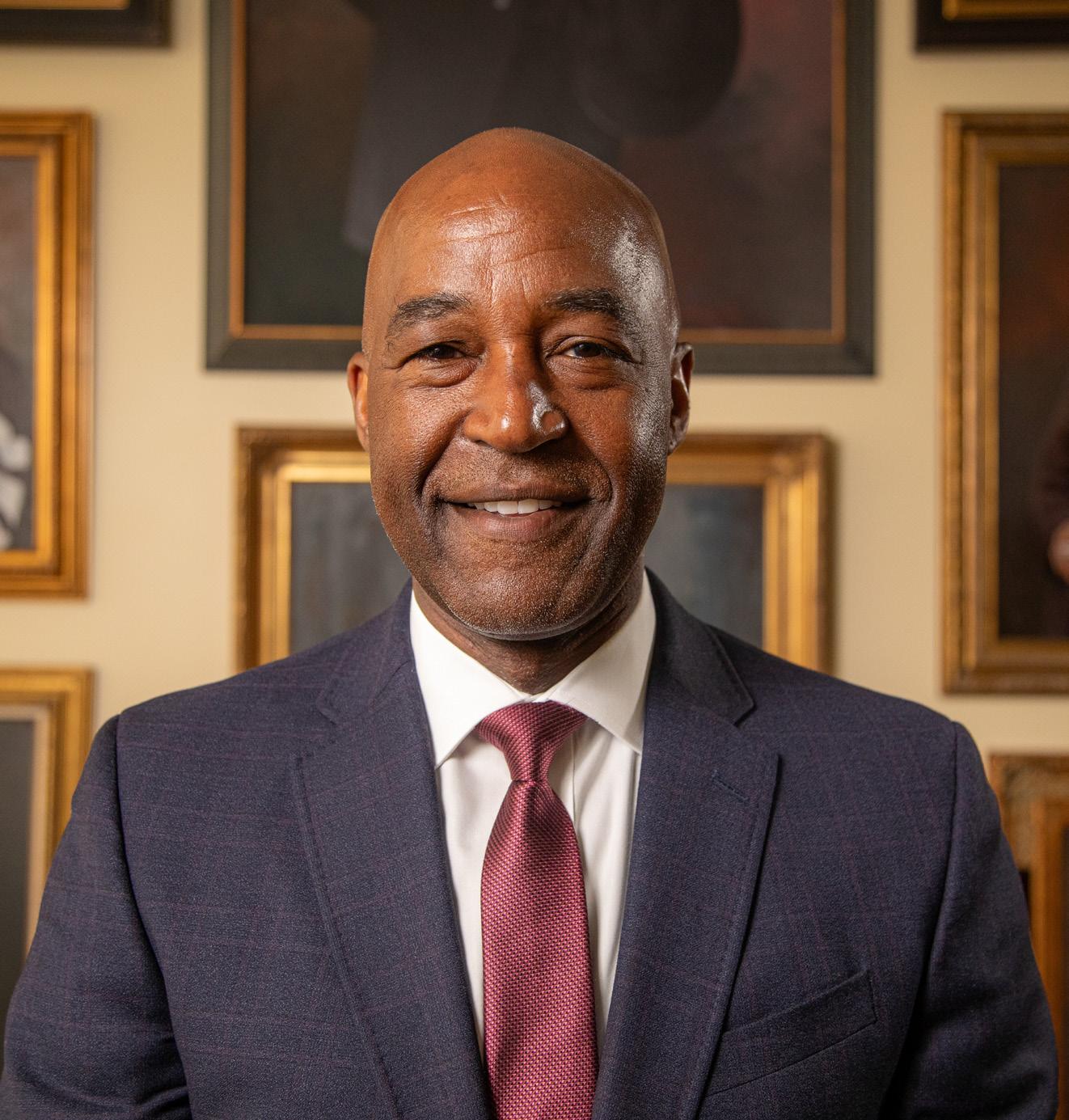

Dr. F. DuBois Bowman, a 1992 graduate of Morehouse College, serves as the 13th president of the College. An internationally recognized expert in biostatistics and public health, his research has advanced understanding of mental and neurological disorders, including Parkinson’s disease, Alzheimer’s disease, depression, schizophrenia, and addiction, as well as the effects of environmental exposures on brain development in youth.
Before returning to Morehouse, he was dean of the University of Michigan School of Public Health and held leadership roles at Columbia University and Emory University. Dr. Bowman is a member of the National
Academy of Medicine (NAM), an elected fellow of the American Association for the Advancement of Science (AAAS), vice president-elect of the American Statistical Association (ASA), past president of the Eastern North American Region (ENAR) of the International Biometric Society, and a proud member of the Psi Chapter of Omega Psi Phi Fraternity, Inc.
He is married to Spelman College alumna Cynthia Bowman, and they are the parents of four children, including a 2024 Morehouse graduate and a student in the Morehouse Class of 2028.
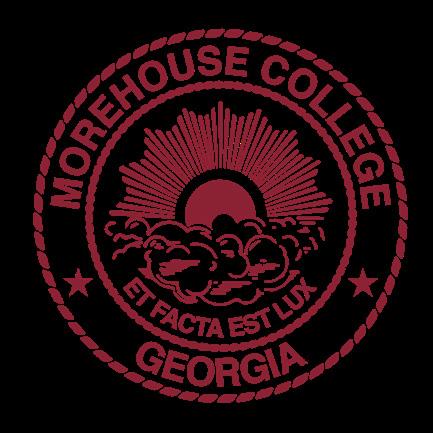
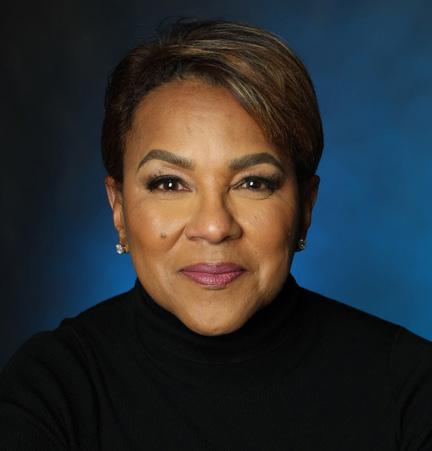

Rosalind “Roz” Brewer stands as one of the most influential leaders in global business today, recognized for her visionary leadership, strategic expertise, and steadfast commitment to advancing equity. Over a groundbreaking career, Brewer has driven innovation across major industries, serving as President and CEO of Walgreens Boots Alliance, COO of Starbucks, and President and CEO of Sam’s Club.
Brewer’s impact extends beyond the corporate sphere through her service on the boards of United Airlines,
the KIPP Foundation, and the Smithsonian’s National Museum of African American History and Culture. A proud Spelman alumna and chemistry graduate, she also holds a rare ownership stake in the NFL’s Atlanta Falcons.
Interim President Brewer returns to Spelman where she now champions educational excellence and prepares future leaders for an evolving world. Brewer’s life’s work embodies a powerful legacy of leadership, empowerment, and transformative change.
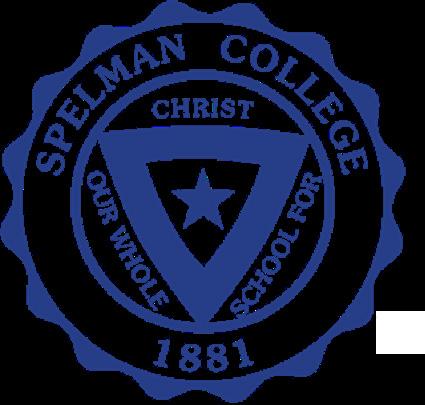

In 1867, two years after the Civil War ended, Augusta Institute was established in the basement of Silver Bluff Springfield Baptist Church in Augusta, Ga.—the oldest independent African American church in the United States. The school’s primary purpose was to prepare Black men for ministry and teaching. Today, Augusta Institute is Morehouse College, which is located on a 66-acre campus in Atlanta and enjoys an international reputation for producing leaders who have influenced national and world history.
Augusta Institute was founded by the Rev.William Jefferson White, an Augusta Baptist minister, cabinetmaker and journalist, with the encouragement of the Rev. Richard C. Coulter, a former slave from Augusta, Ga., and the Rev. Edmund Turney, organizer of the National Theological Institute for educating freedmen in Washington, D.C. The Rev. Dr. Joseph T. Robert, trained minister, physician, and the father of the author of “Robert’s Rules of Order,” was appointed the Institute’s first President by William Jefferson White.
In 1879, Augusta Institute was invited by the Rev. Frank Quarles to move to the basement of Friendship Baptist
Church in Atlanta, and the school changed its name to Atlanta Baptist Seminary. Later, the Seminary moved to a 4-acre lot near the site on which the Richard B. Russell Federal Building now stands in downtown Atlanta. Following Robert’s death in 1884, David Foster Estes, a professor at the Seminary, served as the institution’s first Acting President.
In 1885, when Dr. Samuel T. Graves was named the second President, the institution relocated to its current site in Atlanta’s West End community. The campus encompasses a Civil War historic site, where Union forces battled Confederate soldiers during William Tecumseh Sherman’s famous siege of Atlanta in 1864. The land was a gift of John D. Rockefeller. Atlanta Baptist Seminary became Atlanta Baptist College in 1897, during the administration of Dr. George Sale, a Canadian who served as the third and youngest President from 1890 to 1906.
A new era dawned when Acting President John Hope became the fourth President in 1906, characterized by expanded academic offerings and increased physical facilities. Hope was the College’s First African American President, a Phi Beta Kappa graduate of Brown
University and a pioneer in the field of education and has been recognized as the first “civil rights President” in the American Academy. He encouraged an intellectual climate comparable to that of his alma mater and openly challenged Booker T. Washington’s view that education for African Americans should emphasize vocational and agricultural skills. Atlanta Baptist College, already a leader in preparing African Americans for teaching and the ministry, expanded its curriculum and established the tradition of educating leaders for all areas of American life. In addition to attracting a large number of talented faculty and administrators, Hope contributed much to the institution we know today.
Upon the death of the College’s founder in 1913, Atlanta Baptist College was named Morehouse College in honor of Henry L. Morehouse, the corresponding secretary of the Northern Baptist Home Mission Society. Dr. Samuel H. Archer became the fifth President of the College in 1931 and headed the institution during the Great Depression. He gave the school its colors, maroon and white, the same as those of his alma mater, Colgate University. Archer retired for health reasons in 1937. Dr. Charles D. Hubert served as the third Acting President until 1940, when Dr. Benjamin Elijah Mays became the sixth President of Morehouse College.
A nationally noted educator and a mentor to the Rev. Dr. Martin Luther King Jr. ’48, Mays is recognized as the architect of Morehouse’s international reputation for excellence in scholarship, leadership, and service. During the presidency of Mays, a Phi Beta Kappa graduate of Bates College and the University of Chicago, the number of faculty members grew and those holding doctoral degrees increased from two to 34 out of 65 teachers. The College earned global recognition as scholars from other countries joined the faculty, an increasing number of international students enrolled, and fellowships and scholarships for study abroad became available. Morehouse received full accreditation by the Southern Association of Colleges and Schools in 1957, and Mays’ 14-year effort to win a chapter of Phi Beta Kappa at Morehouse was realized in 1968.
In 1967, Dr. Hugh Morris Gloster ’31, was selected by Dr. Mays to become the first alumnus to serve as President of the College. Under his leadership, Morehouse strengthened its Board of Trustees, conducted a successful
$20-million fundraising campaign, grew the endowment from $3 million to more than $29 million and added 12 buildings to the campus, including the Martin Luther King Jr. International Chapel. Dr. Lawrence Edward Carter Sr. became the first Dean of the Chapel in 1979. Morehouse established a dual-degree program in engineering with the Georgia Institute of Technology, the University of Michigan, and Boston University. Gloster also founded the Morehouse School of Medicine, which became an independent institution, in 1981. He appointed Dr. Louis Wade Sullivan ’54, its first dean; Sullivan later became the school’s first President.
In 1987, Dr. Leroy Keith Jr. ’61, was named eighth President of Morehouse. During the Keith administration, the College’s endowment increased to more than $60 million and faculty salaries and student scholarships significantly increased. Construction of the Nabrit-Mapp McBay science building was completed. In 1994, Nima A. Warfield, a member of the graduating class that year, was named the College’s first U.S. Rhodes Scholar. The “A Candle in the Dark” Gala was founded in 1989 to raise scholarship funds.
In October 1994, Wiley Abron Perdue ’57, vice president for business affairs, was appointed the fourth Acting President of Morehouse. Under his leadership, national memorials were erected to honor Dr. Benjamin E. Mays and internationally noted theologian Dr. Howard W. Thurman ’23. Perdue launched an initiative to upgrade the College’s academic and administrative computer information systems and undertook construction of a 5,700-seat gymnasium, which served as a basketball venue for the 1996 Summer Olympic Games.
On June 1, 1995, Dr. Walter Eugene Massey ’58 was named the ninth President of Morehouse College. A noted physicist and university administrator, Massey called on the Morehouse community to renew its longstanding commitment to a culture of excellence. Before joining the College, Massey had held several notable positions, including dean of the college and professor of physics at Brown University, professor of physics and vice president for research at the University of Chicago, director of the National Science Foundation, and senior vice president and provost of the University of California System.
Under Massey’s leadership, Morehouse expanded its
dual-degree program in natural sciences with Georgia Tech, and launched the Center for Excellence in Science, Engineering, and Mathematics with a $6.7-million Defense Department grant and established a new African American studies program and a center for international studies named for former U.N. Ambassador Andrew Young.
The College was reaccredited by the Southern Association of Colleges and Schools, and the Division of Business Administration and Economics was accredited by the American Association of Schools and Colleges of Business, making Morehouse one of only a handful of liberal arts colleges in the nation with both AASCB accreditation and a chapter of Phi Beta Kappa.
During Massey’s tenure, two more Rhodes Scholars were named—Chris Elders in 2002 and Oluwabusayo “Tope” Folarin in 2004. In June 2006, the College successfully completed Morehouse’s most ambitious capital campaign as of that date—raising a record $112 million, which exceeded the campaign’s goal of $105 million. The same year, Atlanta Mayor Shirley Franklin raised $34 million to give to Morehouse College to acquire the Martin Luther King Jr. Collection. Today, Morehouse is the permanent custodian of this coveted collection, which includes more than 13,000 hand-written notes, sermons, letters, books, and other artifacts belonging to its most noted alumnus, the Rev. Dr. Martin Luther King Jr. ’48.
On July 1, 2007, the Rev. Dr. Robert Michael Franklin Jr. ’75 was appointed the 10th President of Morehouse College. The former president of the Interdenominational Theological Center had previously served as presidential distinguished professor of social ethics at the Candler School of Theology and senior fellow at the Center for the Study of Law and Religion, both at Emory University. During his tenure, Franklin led the institution forward with his vision of the “Morehouse Renaissance,” further elevating public confidence in the College’s continuing stature as a premier institution providing a high-quality education and enhancing the intellectual and moral dimension of Morehouse’s mission and mystique. In part, he accomplished this by establishing the concept of the “Five Wells,” an ideal to cultivate men of Morehouse as “Renaissance men with social conscience and global perspective” who are well-read, well-spoken, well-traveled, well-dressed, and well-balanced.
Under Franklin’s leadership, the College reaffirmed its commitment to academic rigor, underscored by reaccreditation in 2009 by the Southern Association of Colleges and Schools. In a $20-million project initiated by Massey, Franklin oversaw the completion and opening of the Ray Charles Performing Arts Center and Aretha Robinson Music Academic Building, a 75,000-squarefoot facility named after the late, legendary musician. Franklin led and supported cultivation efforts—such as establishing the Renaissance Commission, a blue-ribbon group of 150 influential volunteer stakeholders—which increased the total number of new donors by 4,500. The College had generated more than $68 million in institutional funds ($33 million during the silent phase of the comprehensive capital campaign) and $60 million in restricted funds from federal sources.
After a period of transitional leadership, Dr. John Silvanus Wilson Jr. ’79, an accomplished university administrator, professor, and former executive director of the White House Initiative on Historically Black Colleges and Universities, stepped into office as the College’s 11th President on Jan. 28, 2013. Under his leadership, the College improved student achievement across a wide range of metrics. In addition, Wilson played a pivotal role in bringing President Barack Obama to Morehouse as the Commencement speaker in 2013, and, in 2015, hosting then Vice President Joseph R. Biden, Jr. In 2016, Prince Abudu became the College’s first international Rhodes Scholar, making him the fourth Rhodes Scholar the College has produced.
President Wilson served the College for four years, ending his tenure on April 7, 2017. William James Taggart, a graduate of Howard and Harvard universities, assumed the role of the sixth Acting President of the College after serving as the chief operating officer at Morehouse since 2015. Tragically, just two months after his appointment, Taggart suddenly passed away on June 8, 2017. Two Acting Presidents then led the campus, including Harold Martin Jr. ’02, who left the Morehouse Board of Trustees temporarily to accept the appointment as the eighth Acting President.
In October 2017, the Morehouse Board of Trustees voted to name Dr. David A. Thomas as the 12th President of Morehouse, ushering in a new era of leadership for the College. Thomas took office on Jan. 1, 2018. A visionary
leader, Thomas has 30 years of higher education experience as a professor and an administrator. He holds a doctorate in organizational behavior studies and a master’s degree in organizational behavior, both from Yale University. He also has a master’s degree in organizational psychology from Columbia University and a Bachelor of Administrative Sciences degree from Yale College.
Thomas is the former H. Naylor Fitzhugh Professor of Business Administration at Harvard Business School and the former Dean of Georgetown University’s McDonough School of Business. President Thomas has significantly prioritized fundraising to support campus renovations, faculty research, infrastructure improvements, and other needs. During the President’s first year in office, enrollment applications increased by more than 40 percent, and a fifth Rhodes Scholar was named—Franck Nijimbere, a computer science and mathematics major who was selected in May 2018. The prestigious honor made Morehouse the top producer of Rhodes Scholars among HBCUs.
Under Thomas’ leadership from 2018–May 2024, Morehouse raised more than $262 million in generous donations to: establish endowed scholarships; expand academic program offerings, such as the Black Men’s Research Institute and the Center for Broadening Participation in Computing; and update campus facilities, namely the Martin Luther King Jr. International Chapel and the Edwin C. Moses Track & Field at B.T. Harvey Stadium. With Thomas at the helm, the College has continued to climb national ranking lists, breaking into the list of top 100 liberal arts colleges in the country, while remaining the #1 liberal arts college for men in Georgia. As the #5 HBCUs in the nation, Morehouse has advanced to the top 20 best institutions for undergraduate teaching and social mobility. Of the College’s selective group of approximately 2,300 students, more than half come from families with household incomes of $40,000 or less, yet they continue to be highly recruited by Fortune 500 companies, post-graduation—speaking directly to the return on investment for a Morehouse education.
Morehouse College, the only HBCU focused on educating and developing Black Men, continues its legacy of delivering an exceptional educational experience that meets the intellectual, moral, and social needs of students representing more than 35 states and 17 countries. Morehouse is a top feeder school for Black men entering
prestigious graduate schools and MBA programs. The National Science Foundation also ranked Morehouse as the No. 1 producer of Black men who receive doctorates in education, life and physical sciences, math and computer sciences, psychology, and social sciences, as well as humanities and the arts. Morehouse currently has nearly 19,800 alumni.

Sophia B. Packard and Harriet E. Giles, missionary teachers from New England, founded Atlanta Baptist Seminary in the basement of Friendship Baptist Church April 11, 1881. With $100, Packard and Giles created the school to provide education and training for recently freed female slaves.
The philanthropy of John D. Rockefeller allowed the school to purchase nine acres and five frame buildings two years later. In 1884, the school expressed its gratitude to its generous donor, changing its name to Spelman Seminary in honor of Laura Spelman Rockefeller and her parents Harvey Buel and Lucy Henry Spelman, longtime abolitionists. Through the vision and self-sacrifice of Packard, the seminary was granted a state charter in 1888. Upon Packard’s death in 1891, Giles became president of the seminary. During her years of service (18911910), enrollment grew to 800 pupils, and the curriculum expanded to include high school and college programs of instruction, including teacher, missionary and nurse training.
From 1910 to 1953, the institution experienced unprecedented growth during the presidencies of Lucy
Hale Tapley (1910-1927) and Florence Matilda Read (1927-1953). In 1924, it became a four-year liberal arts college and made substantial strides in its curriculum and organization. Perhaps the most significant event of this time was the signing of the “Agreement of Affiliation” in 1929 by Spelman, Morehouse College and Atlanta University. The agreement served as the foundation upon which the Atlanta University Center was established in 1947.
In 1953, Spelman began a new legacy of leadership when Albert Edward Manley, Ed.D., became the first male and first African American to lead the institution. During his administration (1953-1976), the College increased its enrollment, enlarged the physical plant, and established programs that broadened the educational experience. Donald Mitchell Stewart, Ph.D., Manley’s successor (1976- 1986), improved academic quality by strengthening the faculty and tripling the College’s endowment.
In 1987, Johnnetta Betsch Cole, Ph.D., became the first African American woman president of Spelman. During her tenure (1987-1997), she initiated programs that strengthened ties between the College and local, national
and international constituencies. The Spelman Campaign: Initiatives for the Nineties was successfully completed in 1996 by raising $113.8 million, making it the largest campaign in the history of Black college fundraising.
Spelman obtained another historic moment in 1997 by naming Audrey Forbes Manley, M.D., C’55, the institution’s eighth and first alumna president. Under her direction, the College transitioned into the 21st century by implementing strategic planning, improving infrastructure, enhancing technology, expanding community partnerships, and increasing its endowment. In 2000, the $33.9 million Albro Falconer Manley Science Center was completed.
In 2002, under the leadership of Beverly Daniel Tatum, Ph.D., the Center for Leadership and Civic Engagement (LEADS) and its annual Woman of Color Leadership Conference were created. The Gordon-Zeto Fund for International Initiatives was established in 2008 through a gift of $17 million that helped increase opportunities for international travel for students and faculty and provided additional financial aid for international students.
Dr. Tatum also led the College to complete the most successful capital campaign in Spelman’s history, raising an unprecedented $157.8 million. Mary Schmidt Campbell, Ph.D., began her tenure as the 10th president of Spelman in August 2015. Under Dr. Campbell’s leadership, the Arts@Spelman initiative was established to strengthen the study of the arts and create meaningful collaborative opportunities between the arts and other liberal arts disciplines at Spelman.
The College’s 2022 Strategic Plan, “Imagine, Invent, Ascend,” was launched to focus on four pillars: Deliver the Spelman Promise, Elevate the Spelman Difference, Enhance Operational Excellence and Promote Academic Innovation. Also, in 2017 the College announced the launch of the Riggio Scholars Program and the Dr. Levi Watkins Jr. Scholars Program to recognize the academic achievements of Spelman students.
Helen D. Gayle, M.D., M.P.H., began serving as the 11th president of Spelman College on July 1, 2022. Dr. Gayle previously served as president and CEO of The Chicago Community Trust, one of the nation’s oldest and largest community foundations, from October 2017 to June 2022.
Under her leadership, the Trust adopted a new strategic focus on closing the racial and ethnic wealth gap in the Chicago region. For almost a decade, Dr. Gayle was president and CEO of CARE, a leading international humanitarian organization. A public health physician with expertise in economic development, humanitarian, and health issues, she spent 20 years at the Centers for Disease Control, working primarily on HIV/AIDS, as well as worked at the Bill & Melinda Gates Foundation, directing programs on HIV/AIDS and other global health issues. Over the last decade, philanthropic support has enhanced scholarship resources, faculty research and development as well as capital improvement. Alumnae continue to show their support for the College through Spelman’s “Every Woman … Every Year!” initiative which was launched in 2006.
In 2024, the College achieved a historic milestone with the announcement of a $100 million gift from businesswoman and philanthropist Ronda Stryker and her husband, William Johnston, Chairman of Greenleaf Trust. This extraordinary donation represents the largest single contribution ever made to an HBCU. Spelman secured significant federal recognition through a $2.5 million grant from the Office of the Director of National Intelligence to establish the Spelman Strategic and Security Studies Center.
Leadership excellence reached new heights with the appointment of Rosalind “Roz” Brewer, C’84, as Interim President on October 18, 2024. A renowned corporate executive and Spelman College alumna who has made history as one of the few Black women to reach the C-suite in Fortune 100 companies, earning recognition among Fortune’s “Most Powerful Women in Business.”
Her distinguished career includes transformative leadership roles as President and CEO of Walgreens Boots Alliance, COO of Starbucks, and President and CEO of Sam’s Club, where she consistently drove innovation, digital transformation, and operational excellence across healthcare, retail, and hospitality sectors.
Her influence extends beyond corporate leadership through board positions with United Airlines, the KIPP Foundation, and the Smithsonian’s National Museum of African American History and Culture. Her leadership at Spelman represents a powerful homecoming that
bridges corporate excellence with academic stewardship, positioning the college for continued growth and impact in preparing Black women leaders for global success.
As Spelman moved into 2025, the momentum continues with the Carnegie Classifications recognizing the college as an Opportunity College and University, highlighting its dedication to expanding access and success for diverse student populations.
The opening of the Mary Schmidt Campbell Center for Innovation & the Arts represents another significant investment in creative and entrepreneurial development. In May 2025, Spelman recognized its largest graduating class in history. This achievement reflects not only the college’s growing influence and capacity, but also its unwavering dedication to producing graduates who are prepared to lead with purpose, integrity, and excellence.
Text: James Weldon Johnson
Music: J. Rosamund Johnson
Lift every voice and sing, till earth and Heaven ring, Ring with the harmonies of liberty; Let our rejoicing rise, high as the listening skies, Let it resound loud as the rolling sea. Sing a song full of the faith that the dark past has taught us, Sing a song full of the hope that the present has brought us; Facing the rising sun of our new day begun, Let us march on till victory is won.
Stony the road we trod, bitter the chastening rod, Felt in the days when hope unborn had died; Yet with a steady beat, have not our weary feet, Come to the place for which our fathers sighed? We have come over a way that with tears has been watered, We have come, treading our path through the blood of the slaughtered; Out from the gloomy past, till now we stand at last Where the white gleam of our bright star is cast.
God of our weary years, God of our silent tears, Thou Who hast brought us thus far on the way; Thou Who hast by Thy might, led us into the light, Keep us forever in the path, we pray.
Lest our feet stray from the places, our God, where we met Thee. Lest our hearts, drunk with the wine of the world, we forget Thee. Shadowed beneath Thy hand, may we forever stand, True to our God, true to our native land.

